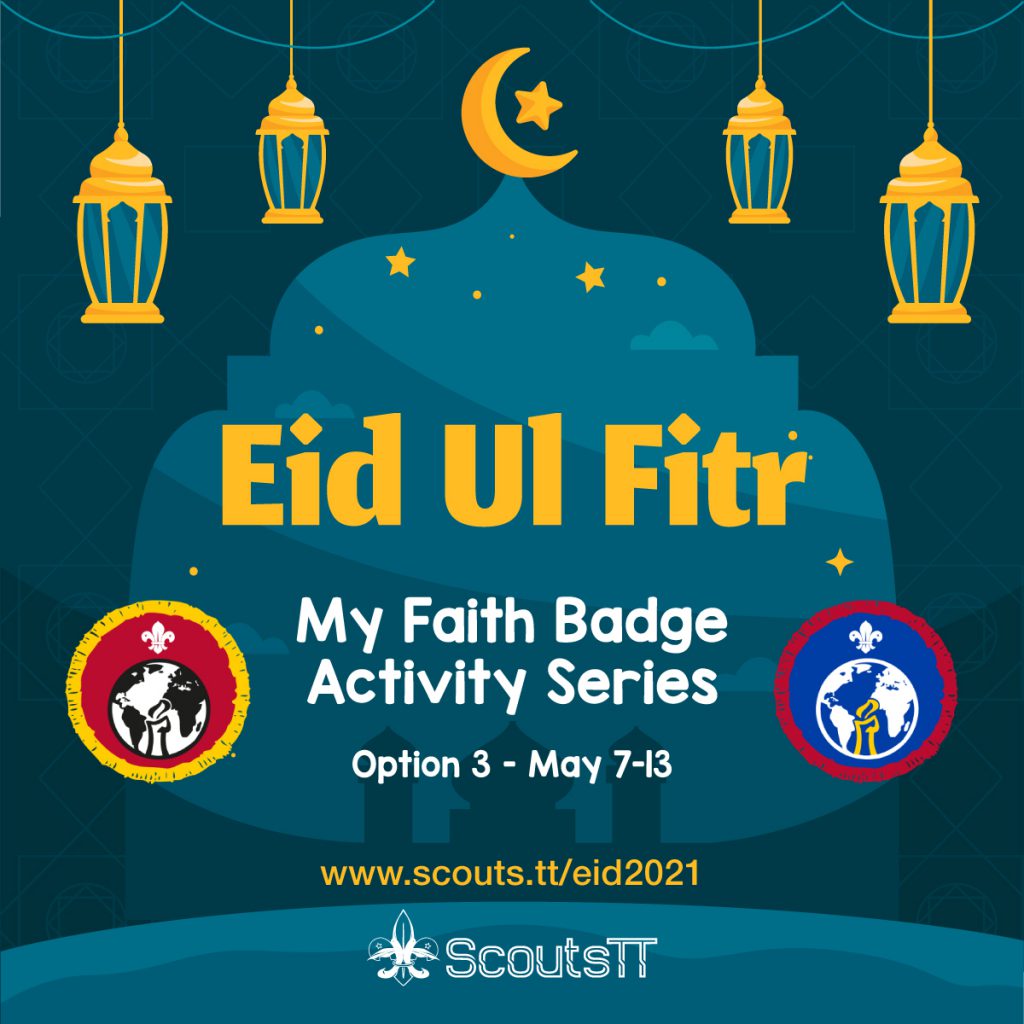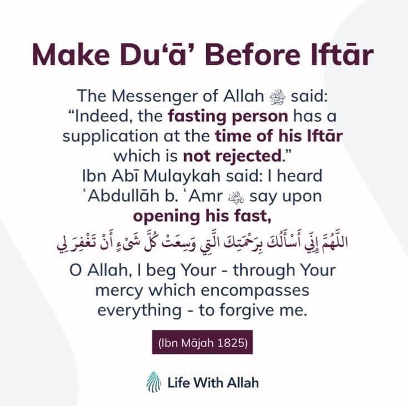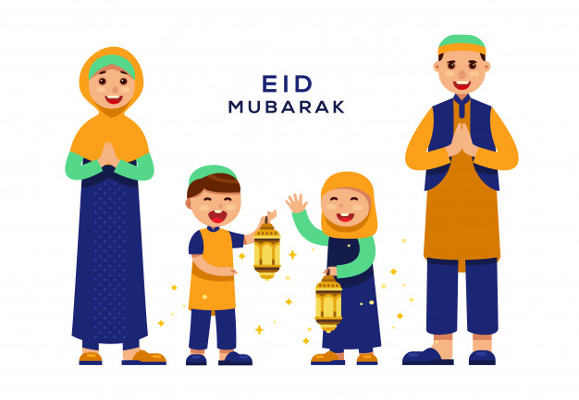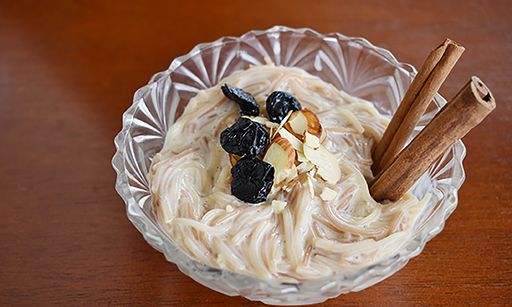EID Ul Fitr
The End of the Month of Ramadan

ScoutsTT presents the third of our My Faith Badge Activity Series, based on Eid Ul-Fitr – commemorating the end of the month of Ramadan.
Once again, this is a three-part series that covers activities:
• Holi – The Festival of Colours
• Holy Week – commemorating the death and resurrection of Christ and
• Eid-ul-Fitr – Festival of Breaking the Fast.
For each of these, ScoutsTT has created a workbook that young persons can use to learn about the highlighted activities and express a deeper understanding of their spirituality and their religion. Young people can also earn the My Faith badge.
Choose any one of the series as they are published and complete the activities in the workbook while guided by a Cub/Scout/Venture leader, Parent or Religious leader.
Once the young person has done all that is required, they can follow the process to be awarded the badge.
Ramadan
Fasting is one of the 5 pillars of Islam. Muslims fast during the daylight hours of the holy month of Ramadan which is the 9th month of the Islamic calendar.
Almighty Allah makes mention in the Quran about the fast in the following verse.
Al-Baqarah 2:183
يَٰٓأَيُّهَا ٱلَّذِينَ ءَامَنُوا كُتِبَ عَلَيْكُمُ ٱلصِّيَامُ كَمَا كُتِبَ عَلَى ٱلَّذِينَ مِن قَبْلِكُمْ لَعَلَّكُمْ تَتَّقُونَ
O you who have believed, decreed upon you is fasting as it was decreed upon those before you that you may become righteous.
What is Ramadan?
Ramadan, is the ninth month of the Islamic calendar, observed by Muslims worldwide as a month of fasting (sawm), prayer, reflection and community. A commemoration of Muhammad’s first revelation, the annual observance of Ramadan is regarded as one of the Five Pillars of Islam and lasts twenty-nine to thirty days, from one sighting of the crescent moon to the next.
Fasting from dawn to sunset is fard (obligatory) for all adult Muslims who are not acutely or chronically ill, travelling, elderly, breastfeeding, diabetic, or menstruating. The predawn meal is referred to as suhur, and the nightly feast that breaks the fast is called iftar.Although fatwas have been issued declaring that Muslims who live in regions with a midnight sun or polar night should follow the timetable of Mecca, it is common practice to follow the timetable of the closest country in which night can be distinguished from day.
The spiritual rewards (thawab) of fasting are believed to be multiplied during Ramadan. Accordingly, Muslims refrain not only from food and drink, but also tobacco products, sexual relations, and sinful behavior, devoting themselves instead to salat (prayer) and recitation of the Quran.
How Do I Use the “My Faith Series” to Earn My Badge?
To earn your badge,
you can pick any one of the series and work with your Cub/Scout/Venture Leader,
Parent or Religious Leader to complete the activities for that event. While
doing the activities, you should keep a personal log (with pictures). Once you
have successfully completed all of the activities, you can share your log with
your leader. Your leader will then assess what you have done in order to award
the badge.
DAY 1: Friday 7th May 2021
A Day of Fasting
Fasting is supposed to teach Muslims about patience and ibadah (faith). It is a time for Muslims to think about how the poor and homeless suffer without food, it helps Muslims to be more obedient, and less greedy. Try to fast from food and water from sun rise to sunset to experience what this is like.
Cubs could try half a day if an entire day is too difficult.
For an extra challenge, continue to fast daily until Eid.
DAY 2: Saturday 8th May 2021
Hamper Drive.
Ramadan allows us to understand and empathise with those who may be less fortunate that ourselves and therefore helps us to understand the importance of charity. On this day, you or your group can collect any item and donate it to those persons who may be less fortunate and may not be able to afford these items. It can be any amount and may be food, school supplies or even clothing.
DAY 3: Sunday 9th May 2021
Digital fast
Ramadan teaches us about sacrifice so that we may appreciate more the things that we have. Today, switch off all of your electronic devices (Cellphones, laptops, smartwatches, even televisions, anything with a screen), no internet, no social media and no telephone calls unless absolutely necessary. Instead, spend time interacting with members of your household.
You can spend the day reading a book, colouring or drawing, sharing stories, playing board games and at the end of the day, preparing meals.
DAY 4: Monday 10th May 2021
Help Prepare Iftar.

What is an iftar?
Iftar, is the evening meal with which Muslims end their daily Ramadan fast at sunset. They break their fast at the time of the call to prayer for the evening prayer. This is their second meal of the day; the daily fast during Ramadan begins immediately after the pre-dawn meal of suhur and continues during the daylight hours, ending with sunset with the evening meal of iftar.
We have learnt that iftar is the meal used by Muslims to break fast at the end of the day. Assist your family in preparing iftar by helping out in the kitchen while the meal is being prepared. Scouts and Ventures can make a dish to add to the meal, while Rovers can put together cooked meals to share with a family that may be less fortunate.
Do some research:
- What does breaking of the fast represent?
- What’s the dua to break the fast?
- What’s the sunnah way to break the fast?
- Think about how those less fortunate feel.
DAY 5: Tuesday 11th May 2021
Day of Reflection
What is Taraweeh?
Taraweeh is derived from the Arabic word meaning “to rest and relax”, as it is seen as a special form of Islamic meditation. These special prayers involve reading long portions of the Qur’an, as well as performing many rakahs (cycles of movement involved in Islamic prayer).
Taraweeh prayers are Sunnah prayers performed at night after Isha Salah during the month of Ramadan
Taraweeh is prayed in sets of two rak’at each, in the same way as you would pray your normal salah. You can choose to pray eight rak’at or twenty rak’at (or any even number of rak’at), as taraweeh is prayed in sets of two rak’at each.
You can recite any part of the Qur’an during your taraweeh prayers—there is no specific obligation to recite a specific part of the Qur’an.
Use this day to perform Taraweeh with your family. If you are not a Muslim or are unable to fully complete Taraweeh, you can reflect on the teachings of Islam during the month of Ramadan and meditate for 15 minutes while focussing on how much you have in your life.
Make a list of 10 things that you are grateful for.

DAY 6: Wednesday 12th May 2021
What does Ramadan mean to me?
Now that you have learnt about Ramadan and what Muslims do during the month, here are some activities for you to complete today.
Cubs: Do a drawing
Scouts: Do a poem (can be 6-10 lines)
V/Scouts & Rovers: Create a short video explaining an aspect of Ramadan that appeals the most to you and share with your group or friends via social media using #MyFaith, #ScoutsTT
Make Dua
In the terminology of Islam, dua, literally meaning invocation, is an act of supplication. The term is derived from an Arabic word meaning to ‘call out’ or to ‘summon’, and Muslims regard this as a profound act of worship. This is when Muslims from all over connect with God and ask him for forgiveness and favors. The Islamic prophet Muhammad is reported to have said “Dua is the very essence of worship.”
Make dua or say a prayer together with your family.
Be sure to look out for the moon tonight that marks the end of Ramadan.
DAY 7: Thursday 13th May 2021
Eid Ul-Fitr

What is EID?
Eid ul-Fitr or EID is a religious festival celebrated by all Muslims worldwide which marks the end of the holy month of Ramadan. Muslims across the globe celebrate Eid ul-Fitr by taking part in prayers that are followed by a sermon soon after dawn. The day continues with devotees wearing new clothes, exchanging greetings by saying “Eid Mubarak”, which means “have a blessed Eid”, and also distributing sweets. Children receive gifts and money from elders. The day is incomplete without a widespread food menu containing a variety of dishes including Biryani, Haleem, Nihari, kebabs and a dessert like Sawine. As one of the five pillars of Islam, Zakat or giving alms to the poor is also practiced on Eid.
Help make Sawine
What is Sawine?
Sawine is a Trini dessert that is traditionally prepared on Eid-ul-fitr, a Muslim holiday. It is made with vermicelli noodles, almonds, sugar, milk, cinnamon, and raisins. It is a famous dish to prepare on this religious holiday.
Steps to prepare Sawine:
- Parch the Sawine
- Pour 2 cups of milk at medium heat
- Add cinnamon, ginger, cardamom and clove to bring to a boil.
- Add sugar and mix until dissolved
- Add vermicelli and let cook until tender.
- Add the remaining milk, almonds and raisins and mix well

Say a prayer asking for forgiveness for any sins that you may have committed and share a meal and a tasty cup of sawine with members of your home.